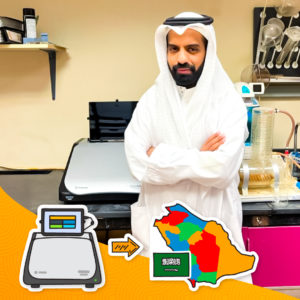
When setting up a new research lab, many researchers opt to outfit their new space with the technology and materials that got them through their academic studies. After graduating with his PhD from the University of Wisconsin-Madison, Dr. Tawfiq Alsulami will be traveling with a GloMax® Navigator Microplate Luminometer across the globe to continue his work as Assistant Professor in the Department of Food Science and Nutrition at King Saud University. Dr. Alsulami and his new lab at KSU will be using the NanoBiT® system to develop novel assays for the future of food testing.
Dr. Tawfiq Alsulami answered a few of our questions regarding his upcoming research at KSU and offered a few pieces of advice to new labs. Read the Q&A below:
Tell us about your PhD research at University of Wisconsin – Madison.
My PhD research was focused on developing an easy and fast method for mycotoxin detection in foods. There are few mycotoxins including aflatoxins, ochratoxin, patulin and fumonisins that are produced by certain fungi and posing global food safety issues. The presence of mycotoxins in foods can be only avoided by finding these tiny toxic compounds in foods before reaching the consumers. Promega scientists and I successfully developed highly sensitive and quick immunoassay utilizing NanoBit technology. This method can find and quantify fumonisin B1 with high sensitivity, accuracy, and low food matrix effects.
How has the GloMax® instrument impacted your ongoing research at King Saud University?
To the best of my knowledge, no research has been conducted using NanoBiT® technology or luminescence at King Saud University (KSU). Thus, GloMax® paves a new way to a scientific approach in various subjects. Currently, I am setting up my laboratory and professional team. Once I finish my setting up, I will start my research.
Can you speak to the state of research technology in Saudi Arabia?
Yes, I can. As KSU faculty members, we are always in touch with research related organizations such as King Abdulaziz City for Science and Technology (KACST). In addition, I have been recently assigned as a member of the Scientific Advisory Council for Food Safety at Saudi Food and Drug Authority (SFDA). This would also keep me in a connection with important related entities.
What advice do you have for scientists who are setting up a new research lab?
My first advice is that the scientist leaders must answer very important questions such as why they need to establish a new lab, what they want to achieve and what tools they need to achieve their goals.
Secondly, the scientists should be aware of all law aspects about the country where they want to establish a lab. For example, in the Kingdom of Saudi Arabia any lab must have ISO 17025 laboratory accreditation to be governmentally recognized.
Third, all scientists should work as one team and this can be done through a good business management. Fourth, creativity and novelty should be the main motivation of the scientific team, by which they can represent themselves to the related entities.
Read our previous blog post which explores Dr. Tawfiq Alsulami’s collaboration with Promega to develop a bioluminescent biosensor that enables simple and rapid detection of mycotoxins in food samples.
Learn how our sensitive, ready-to-use microplate luminometer can maximize your assay performance.

Dear manger, I am writing to express my interest in the company as a Molecular Genetic Specialist with a Master’s in Medical Molecular Biology with Genetics from Bangor University, I have extensive experience in laboratory techniques, genetic analysis, and microbiology. I am confident that my skills and background align well with the needs of your team. During my time at AL BORG Diagnostics and King Faisal General Hospital, I gained hands-on experience in molecular biology, cytogenetics, and microbiology, which further honed my ability to conduct precise and effective laboratory work. I have a deep understanding of nucleic acid extraction, PCR techniques (both conventional and real-time), Sanger sequencing, and next-generation sequencing. I have also been actively involved in research and development, contributing to scientific advancements in genetic therapies, such as my work on Ro60 splice variants and leukemia treatment. In addition to my technical expertise, I am ISO17025 and HACCP certified, ensuring that I uphold the highest standards of quality and safety in all my laboratory work. My experience leading teams and collaborating with colleagues has also allowed me to develop strong communication and problem-solving skills. I am passionate about continuous learning and dedicated to making meaningful contributions to the field of genetics. I am excited about the opportunity to bring my expertise and enthusiasm. I would welcome the chance to discuss how my background and skills can contribute to your organization’s goals. Thank you for considering my application, and I look forward to the possibility of speaking with you soon.
Thank you for your interest. All open positions are posted at: https://www.promega.com/aboutus/careers/